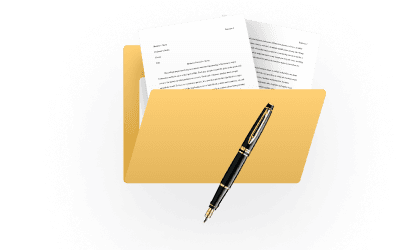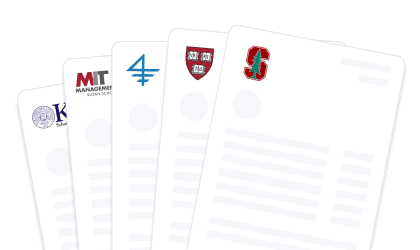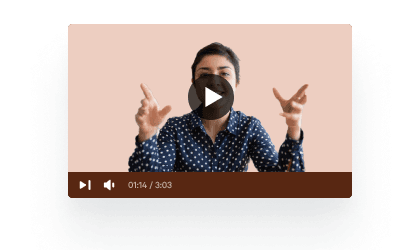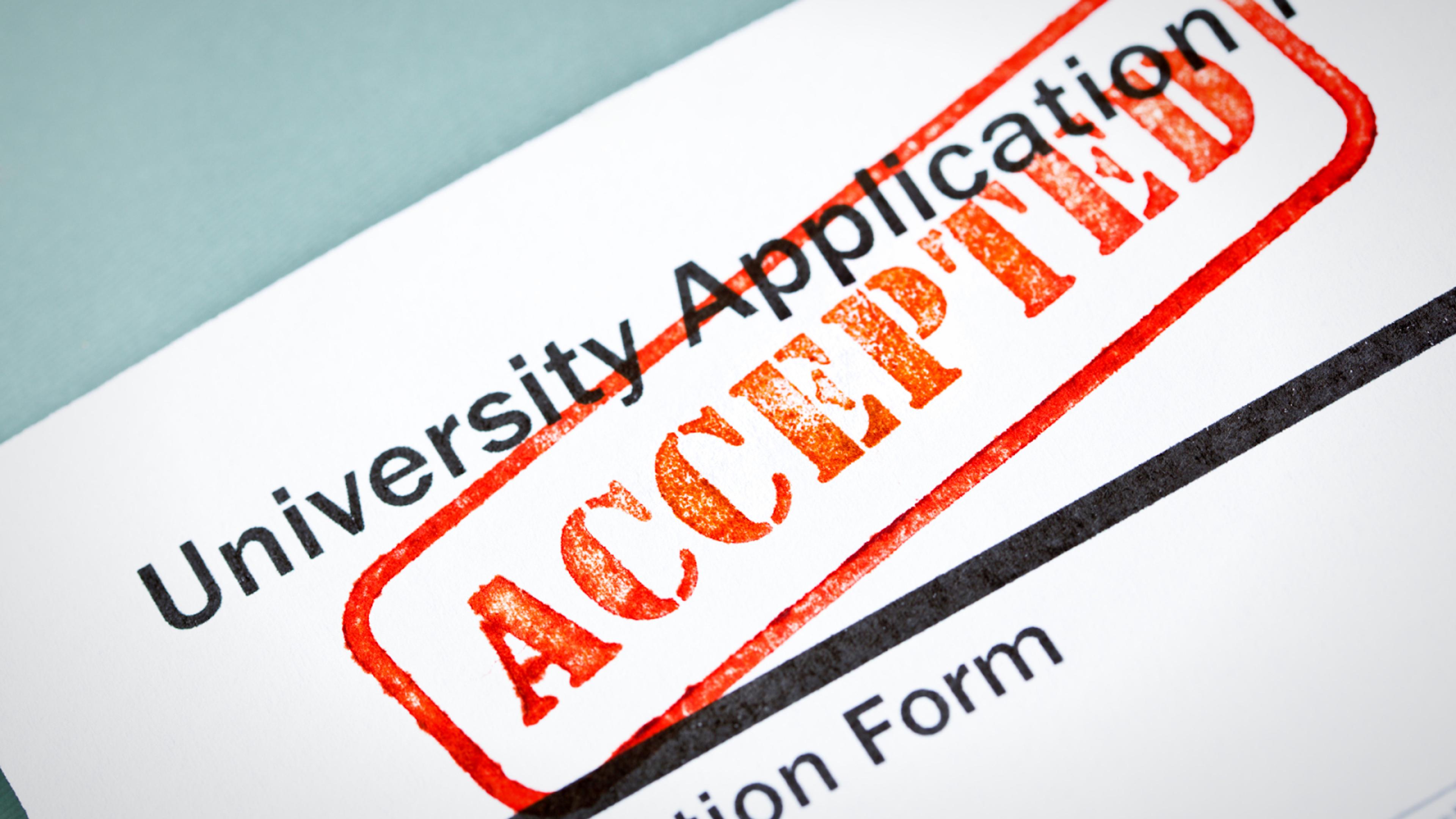
Join a free event
Learn from top coaches and industry experts in live, interactive sessions you can join for free.
Table of Contents
If you’ve landed an interview with Columbia Business School, congrats! That means you're halfway to one of the most competitive MBA programs in the world. But now comes the part that can make or break your application: the interview.
As a Columbia MBA alumna and current Admissions Interviewer, I know exactly what the school is looking for in its applicants. This guide will walk you through what to expect in the Columbia MBA interview: from format and timeline to common questions and expert-backed interview prep tips.
Whether you're prepping months in advance or gearing up for a fast-approaching date, you’ll find real insights, sample questions, and strategies to help you stand out with confidence and clarity.
Columbia Business School Interview
Overview
Columbia Business School interviews are invite-only, extended to roughly 50% of applicants. If you’re invited, it means CBS sees real potential in your candidacy, but they want to learn more about who you are beyond the application.
- Format: Blind. You are expected to email your interviewer your MBA resume beforehand; otherwise, they will not come in with any knowledge of you. Additionally, when booking your interview, you will not know who your interviewer is. Their name and email will be provided to you 48 hours before your scheduled interview.
- Type: Typically virtual, but possibly in-person, depending on where you live.
- Interviewer: Your interviewer will be a trained second-year student, a trained alumnus, or an admissions officer.
- Style: Behavior-focused and conversational in nature.
- Length: 45 minutes.
- Timeline: Invitations are sent out on a rolling basis within six weeks of the application submission.
Because interviews are blind, your resume becomes the focal point. Your interviewer won’t know your test scores, essays, or recommendations, so you’ll need to clearly articulate your story, career goals, and reasons for choosing Columbia. It’s less about defending your application and more about how you present yourself in real-time.
Expert Tip: Use your resume to your advantage. Before the interview, review your resume line by line and ask yourself: “What story does this tell? What follow-up questions might it invite? Where do I want to go deeper, and where do I want to redirect?” Then, practice weaving in transitions like: “That role actually led me to realize how much I value cross-functional collaboration, which is part of what drew me to Columbia’s cluster learning model…” This shows you’re not just answering questions, you’re guiding the narrative. You’re making it easy for the interviewer to connect the dots and see your fit.
Interview Timeline (2025-2026)
The following admissions committee interview decision release timeline is expected:
- Round 1: Interview decisions released by November 13, 2025. Final decisions by December 15, 2025.
- Round 2: Interview decisions by February 19, 2026, and the final decisions by March 31, 2026.
- Round 3: Decisions by May 1, 2026. Final decisions by May 20, 2026.
See: How to Ace Your MBA Interview: With Prep Questions & Answers
Common Columbia MBA Interview Questions (& How to Approach Them)
Every Columbia MBA interview is different because it depends entirely on your interviewer, who’s most likely an alum and only has your resume in front of them. But across hundreds of interviews, certain themes repeat: leadership, self-awareness, communication, clarity of goals, and genuine fit with Columbia. Most interviewees at Columbia have reported that there is a smaller set of questions and more of a natural, back-and-forth conversation. With that being said, they often ask similar types of questions or are looking for similar types of answers.
Here are some common ones and how to think about answering them:
“Tell me about yourself.”
What they’re really asking: Can you distill your story into a clear, compelling narrative? Are you self-aware? Can you connect the dots? Interviewers often say this is the most telling question – they know within 2 minutes whether you're prepared, polished, and intentional. Practice until it feels natural, not memorized.
How to approach it:
- Use a past → present → future structure, and make it tailored to CBS.
- Don’t walk them through your resume. Instead, highlight the 1–2 themes that define your career journey so far.
- End with where you're headed and how Columbia fits specifically into that vision.
“Why Columbia Business School?”
What they’re really asking: Have you done your homework, and are you genuinely aligned with what CBS uniquely offers? The school wants to admit people who are actually a good fit for the program, who know what they’re getting into, and have put in the work to do so.
How to approach it:
- Mention 3 (or more) specific CBS resources that are uniquely relevant to your goals. (Examples: the Value Investing Program, Lang Center, Chazen Global Study Tours, NYC location, or cluster learning model.) CBS knows what makes them great in general, but wants to learn what makes them great for you.
- Reference conversations with students or alumni, which show real effort. It will also give you way more unique and interesting answers based on recent experiences.
- Explain how Columbia’s location, culture, and curricular flexibility directly enable your career plans.
- Avoid generic answers at all costs. “Great location,” “diverse students,” or “strong network” won’t cut it. If your answer could be used for any top MBA or any top candidate, rewrite it.
“What are your short-term and long-term goals?”
What they’re really asking: Are your goals credible, ambitious, and well thought out? Can CBS actually help you get there? Overall, Columbia really cares about what they call “professional promise”, which is evidenced by the thoughtfulness and clarity of your career goals, and if you have a clear plan to get from CBS to your immediate post-MBA goal, to your 3-5 year goal, and to your long-term dream job.
How to approach it:
- Be specific: titles, industries, companies, and geographies matter.
- Show a clear line between your pre-MBA experience, your MBA goals, and your long-term ambitions.
- Again, prove that you’ve done your homework. Mention CBS classes, clubs, or programs that will directly support your career transition or acceleration.
Expert Tip: Columbia loves purpose-driven applicants who can articulate not just what they want to do, but why. Your goals also need to actually fit in with your history and skills/background – they need to be credible. Both of these things also add to the likelihood that you will actually accomplish what you say you’re going to do and reflect well on the program.
“Describe a leadership experience.”
What they’re really asking: Can you lead in ambiguous, high-stakes situations? Do you inspire followership, navigate team dynamics, and grow from experience? Columbia isn’t just evaluating what you did; they’re assessing how you think about leadership.
How to approach it:
- Choose a specific, high-stakes moment, not a general leadership role. Bonus points if it involved cross-functional teams, pressure, or interpersonal tension.
- Use the STAR method, but keep it crisp. Prioritize your decisions, thought process, and impact over listing every detail. The “what did you learn” is as important, if not more important, than the “what you did” part. The best candidates don’t just tell a great story; they connect it to who they are today and who they’re becoming.
- Show leadership beyond title, examples where you influenced without authority, drove alignment, or turned around a tough situation, land especially well with CBS.
- Quantify outcomes if possible. (Did you change a process? Save time or money? Shift team morale?)
Behavioral and Situational Prompts
Examples: “Tell me about a time you failed,” “Had to work with someone difficult,” “Made a tough decision,” etc.
What they’re really asking: How do you operate under pressure? Can you reflect honestly, adapt quickly, and grow from experience? CBS is assessing your emotional intelligence, self-awareness, and decision-making under uncertainty, very key traits for future business leaders.
How to approach it:
- Use STAR, but the real differentiator is your thought process. What was going through your head? What tradeoffs did you weigh? What would you do differently now?
- Don’t dodge the question or sugarcoat failure. CBS values humility and accountability far more than perfection.
- Choose stories with real stakes, where something meaningful was on the line (trust, reputation, results, morale).
- Most importantly, close the loop: What did you learn, and how have you applied that lesson since? That last step is where many candidates fall short. Take time to reflect and think about the “so what?”
Expert Tip: Columbia’s blind interview format means they don’t have your essays to lean on, they’re listening closely for how you handle ambiguity in the moment. Show them you can own a challenge, learn from it, and come out stronger – and that you’ll bring that same maturity to their MBA classroom and community.
“What makes you different from other applicants?”
What they’re really asking: What unique value will you bring to a CBS classroom or cluster?
How to approach it:
- Avoid clichés like “hardworking” or “passionate.” Instead, lean into your unusual intersections: career + geography, technical + creative, nonprofit + finance, etc.
- Highlight something that broadens class perspective – language fluency, global experience, underrepresented background, or niche expertise.
- Connect it to how you’ll contribute at CBS, not just what makes you interesting. Business schools want two-way relationships: you bring something to the class, and they bring all the benefits of an MBA program to you.
Expert Tip: One of the best answers we’ve ever heard came from a former professional poker player who tied game theory, risk, and reading people to leadership in high-stakes business. He planned to share this at Columbia by starting a Poker Club, where he could teach these skills to fellow students and also encourage networking.
Overall, use this illustrative example as inspiration to find your edge. At the surface level, many people’s backgrounds or applications can appear similar; they have similar passions, work experiences, goals, etc. However, when you dig deeper and connect the stories of your life that have led to why you are the way you are, you’ll find a lot of uniqueness to lean on.
Other Common Interview Questions
- Walk me through your resume.
- Interests and hobbies – Be prepared! Questions as basic as “Why do you do poetry (or any other activity)?” may be asked.
- Why MBA?
- Why an MBA now? (Why an MBA at this stage of your career?)
- What is your Plan B if your current career plans don't happen?
- Note - this question usually does come up in CBS interviews, as Columbia cares about how well you have thought through your career plans. Similar questions would be “What is your Plan B if you don’t get into CBS this year?” or “What is your Plan B if you don’t land your preferred MBA summer internship?”
- What are your key strengths? What is your biggest weakness?
- What do you bring to Columbia Business School?
- Why should we take you?
- What makes you different from other applicants?
- Interests and hobbies – Be prepared! Questions as basic as “Why do you do poetry (or any other activity)?” may be asked. Rehearse the most likely questions in mock interviews, but be ready to think on your feet and adapt as well.
Questions to Ask Your Interviewer
The questions that you ask your interviewer are incredibly important. They show your enthusiasm, thoughtfulness, creativity, and are one of the most underrated places to leave a great impression. Your questions should be customized to your background and goals, and to who the interviewer is. Here are a couple of ideas to get you started, but take time to brainstorm your own as well.
If your interviewer is an alum…
- Looking back, what part of CBS had the biggest impact on your post-MBA career that you didn’t expect at the time?
- Were there any courses, professors, or experiences that shifted your thinking or direction in a meaningful way? (Note - consider not asking this of an alumnus who has been out of CBS for more than 5 years.)
- How has the Columbia network shown up in your professional life since graduating?
- What do you wish you had known before starting at CBS?
- What surprised you about your business school experience?
If your interviewer is a current student…
- What has surprised you most about the CBS student experience?
- How have you found your community at CBS; has it been through your cluster, clubs, or something else?
- How do you recommend approaching the second, third, and fourth semesters to get the most out of Columbia’s flexible curriculum?
- Is there a specific initiative or club you’ve been involved with that you think makes CBS unique?
- What do you wish you had known before starting at CBS?
If your interviewer is an admissions officer…
- How does Columbia think about building a well-rounded class in terms of background, experience, and voice?
- What distinguishes successful applicants, not just those who get in, but those who thrive once they’re here?
- Are there any new initiatives or focus areas (academic or otherwise) that the admissions team is especially excited about right now?
Expert Tip: Never ask something you could have Googled. Show the same level of prep in your questions as you do in your answers. And tailor your questions based on who’s across the (virtual) table; you want your curiosity to feel earned and specific, not performative.
Read: Top 20 Questions to Ask During Your MBA Application Interview

Columbia MBA Interview Tips
The interview hinges on how well you can tell your story, connect with someone who’s been in your shoes, and prove you belong at CBS without relying on your written application.
Now that we’ve covered the specifics, we can bring it all together into a list of core tips for your interview.
1. Own your narrative and don’t regurgitate your resume.
Your interviewer only sees your resume. That gives you full control over the story.
Before the interview, identify 2-3 core themes that tie your experience together (e.g., leading through ambiguity, building across cultures, bridging business and tech). Map each bullet on your resume to a potential story or talking point – what might they ask about this role? What’s the real takeaway you want them to remember? Show how your past connects logically and intentionally to your goals and why CBS is the bridge.
2. Practice like a performer, not a parrot.
Great answers aren’t memorized, they’re internalized. Practice delivering your answers the way you’d practice for a client pitch: structured, confident, and flexible. But don’t over-rehearse to the point that you come off as rote and robotic. Do at least one mock interview beforehand – this is the #1 thing that you can do to improve your performance. Ideally, you should do the mock interview with someone who knows the CBS interview style and can evaluate you based on real experience getting people in. Find a coach with CBS-specific experience here.
3. Master your “Why Columbia?” answer – this is make-or-break.
CBS wants to admit people who really want to be there. And with how many people they interview, they will know pretty instantly when your answer is vague or recycled. If you’re having trouble brainstorming this answer, start by including: one program-level fit (e.g., PE/VC club, Healthcare & Pharmaceutical Management Program), one community/cultural fit (collaborative cluster system, location-based learning, etc.), and one personal connection (conversation with a student, class visit, something you learned from an event, etc.). Each one of these should be personalized to your background and goals.
4. Build 3-5 polished STAR stories and know how to pivot them.
You will get behavioral questions. Your stories need to be tight, flexible, and tailored to CBS values: leadership, collaboration, integrity, and impact. Prepare 5 stories using the STAR format, each mapped to different themes: leadership, failure, conflict, teamwork, and innovation. Highlight what you did, not what the team did. Use numbers or results where possible. Then, practice “pivoting” a story to multiple questions (e.g., one story that could answer either “Tell me about a leadership moment” or “Describe a time you influenced someone without authority.”).
5. Mirror the energy of your interviewer.
Because CBS interviews are usually with alumni, tone and chemistry matter. Some interviewers will be warm and chatty, others more formal. The best candidates adapt subtly. Pay attention to your interviewer’s pacing and tone (are they joking or serious?), how conversational they are (can you build rapport without overstepping?), and their interest level (if they ask follow-ups, lean in; if not, keep answers crisp.) The best interviews usually feel like a two-way conversation. You’re there to understand if CBS is the right fit for you as much as they are doing the same.
Expert Tip: CBS alumni want to see if you’re someone they’d want in their classroom or team. Show that you’re confident but humble, curious but prepared, and ambitious but grounded. You want to show them that you’d be a great addition to any MBA class – that you’ve thought through your whys, know yourself, know what you bring to the table, have ambitious but credible goals, and are uniquely a good fit for CBS.
The Bottom Line
The Columbia MBA interview isn’t about having the perfect answers. It’s about showing up as the kind of candidate who is thoughtful, driven, and genuinely aligned with what CBS values: sharp thinkers, grounded leaders, and people who will contribute meaningfully to their community.
If you can tell a clear story, demonstrate self-awareness, and connect your goals to what Columbia uniquely offers, you’ll stand out. And remember, most candidates do not practice for their interviews enough. But the ones who do show up calmer, sharper, and more confident and they get the offer.
Ace Your Interview With the Help of an Expert
If Columbia Business School is at the top of your list, there’s no better guide than someone who’s been on both sides of the table. As a Columbia MBA alumna and current CBS Admissions Interviewer, I know exactly what the school is listening for in your interview responses because I’ve conducted those interviews myself.
When we work together, we’ll go far beyond generic mock interviews. I’ll help you deeply understand the Columbia interview format, decode what each question is really assessing, and craft compelling responses that align with your personal brand and CBS’s values. Whether you’re applying for Columbia’s Full-Time MBA, J-Term, or EMBA, we’ll tailor your prep to the program’s unique expectations.
With a track record of helping 200+ M7 admits, including dozens into CBS, I’ll help you:
- Prepare for CBS’s behavioral and school-specific questions with precision
- Highlight your leadership potential and NYC-specific fit
- Develop crisp, confident stories using proven MBA interview frameworks
- Fine-tune your presence and delivery with executive-level coaching
I combine insider insight, storytelling expertise, and executive coaching certification to help you become someone CBS wants in their classroom. Let’s connect and get you fully ready to ace your Columbia interview.
If you’d like to read more, here are some other articles you may find helpful:
- Top 25 Business Schools' Acceptance Rates & Class Profiles: Data, Trends, and What It Takes to Get In
- MBA Interviews: What to Expect, How to Prepare, and How to Stand Out
- Top 20 Questions to Ask During Your MBA Application Interview
- How to Choose an MBA Program — According to Former AdComs (2025–2026)
- What Are MBA Adcoms Looking for in Resumes
FAQs
What percent of Columbia MBA applicants get interviews?
- Around 50% of applicants receive an interview invitation.
Does Columbia MBA do interviews?
- Yes. Columbia MBA requires interviews for candidates who are invited to the next stage of the admissions process.
How difficult is it to get into the Columbia MBA?
- Columbia MBA is highly competitive, with a rigorous application process and a low acceptance rate.
Can I get into Columbia MBA with a 3.3 GPA?
- While a 3.3 GPA is lower than the average, it’s still possible to gain admission if you have a strong professional background, excellent recommendations, and clear career goals.
Browse hundreds of expert coaches
Leland coaches have helped thousands of people achieve their goals. A dedicated mentor can make all the difference.


























